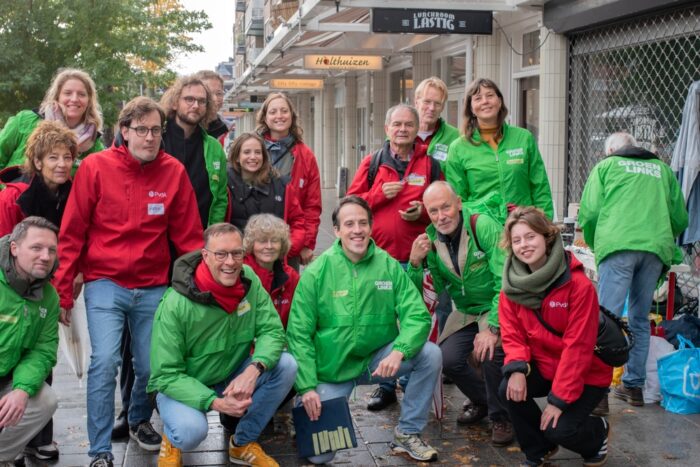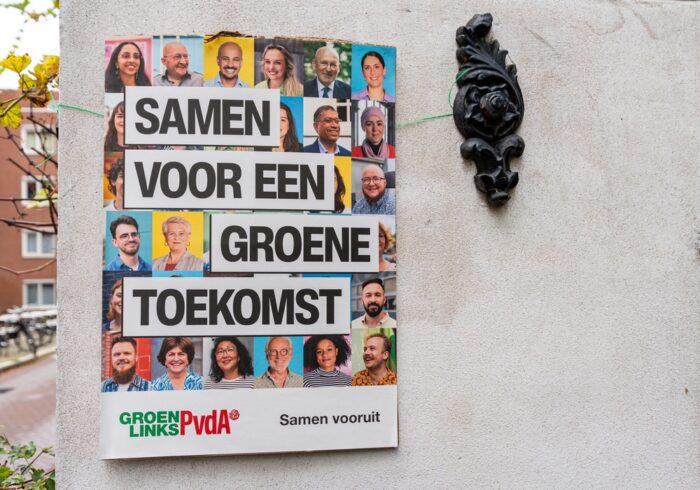Find all related Progressive Post
Progressive Post

The elections to the European Parliament brought many surprises in the Czech Republic. While the historically high turnout may sound optimistic, the results themselves are a strong warning. Even our country at the heart of Europe has not escaped the phenomenon of growing support for anti-establishment populist political forces, black-and-white narratives with strong mobilisation appeals and emotions of fear and threat.
European elections are traditionally accompanied by low interest among Czech voters. Although this year’s voter turnout exceeded 30 per cent of the vote for the first time in the country’s EU membership (36.45 per cent to be precise), this is a low figure especially compared to the turnout in the elections to the Chamber of Deputies or the presidential elections. This means that these elections are still perceived by the Czechs as second-order elections.
The assumption of a higher interest in the European elections among people from larger cities, with higher education and higher socio-economic status, was confirmed (in Prague, more than forty per cent of citizens voted). In large cities, the governing coalition of right-wing conservative and liberal parties also scored unsurprisingly. However, what drove up turnout figures across the country was the mobilisation of voters in smaller towns and villages in what we call the ‘periphery’ – see map. These are located both on the borders and also within regions.
Map of changes in voter turnout, showing the increase in voters in the so-called peripheries. The darker the blue, the lower the turnout compared to 2019. Conversely, the greener the colour, the more significant the increase in turnout compared to the last European elections. Author: Jakub Lysek, Palacky University.
The outer (border) and inner peripheries share common characteristics. Low quality and availability of public services, poor transport infrastructure, more difficult access to jobs and significantly lower wages than the national average. Objectively, people who live here are more likely to send their children to lower-quality schools. They have trouble finding doctors, especially paediatricians and specialists. Dental care has completely disappeared in some areas. Regional hospitals are either privatised or have closed. The frequency of public transport services is low and insufficient. People here must rely on their own cars, often ten or twenty years old. In addition to objectively worse living conditions, several sociological studies show that people here also subjectively feel the decline of their surroundings, especially the collapse of traditional industrial firms. In short, citizens in the peripheries have little reason to trust the system (whether the state or the EU). And this election has also shown that they no longer believe in it.
Although the populist ANO movement won with 26.1 per cent of the vote, the real winners of this election are new entities with a stronger anti-system appeal. It was they who managed to mobilise the alienated voters of the Czech and Moravian peripheries by opposing the Green Deal, the migration pact and the so-called Brussels dictate. For example, the Enough! coalition, led by current Communist MEP Kateřina Konečná. The leader of the Czech Communists has managed to hide an unattractive old left-wing party behind a new brand and to attract independent candidates from the conservative nationalist left as well as from the alternative right and the disinformation scene. Socio-economic issues were ignored. Konečná actively campaigned against the Green Deal, held strong opposition to the migration pact and managed to carve out a particularly strong position on the issue of the war in Ukraine (no military aid, immediate peace). There were also people on the ticket with links to the disinformation scene and the anti-vaxxer movement, whose ability to use alternative forms of communication (mass emails, closed groups on social networks, etc.) allowed them to reach out to broad groups of disaffected citizens.
The other successful entity is the Oath and Motorists coalition, which also won two seats. They owe their success to their charismatic leader Filip Turek, who was a well-known figure on social media, where he often commented on political events. Turek is characterised by his arrogance, chauvinism, macho style and criticism of progressive politics. His most prominent theme was the protection of motorists, specifically the lifting of the ban on the production of cars with internal combustion engines. With this, Turk managed to appeal especially to young men and those who feared losing their beloved cars due to the EU regulations. In the peripheries, a car is necessary to get to work to the doctor or to a supermarket. Protecting cars from the ‘evils’ of Brussels was a simple and strongly mobilising issue with clear emotion. However, behind the seemingly trivial topic, there is a more complex sociological and psychological construct. People, especially those of lower socio-economic status, who have lost rather than gained ground in all the crises of recent years, have a subconscious fear of the challenges we will face as a society because of adaptation to climate change. Both Konečná and Turek tell these people that they will stop these changes. Symbolic of this is the Green Deal being pushed by the elites (right-wing government, progressives) versus the defenders of the internal combustion engine – signifying the old order (Konečna, Turek). The vote for anti-establishment was a vote against the system and for a world that people know and somehow still manage to make a living in.
Finally, a brief word about the result of the only democratic left – Social Democracy. After dropping out of the chamber of deputies in 2021, the Social Democrats are seeking a rebrand. However, they won only 1.9 per cent of the vote in the European election and have only a year to get out of the critical situation before the next parliamentary elections. Their efforts are hampered by a lack of funding compared to their competitors, limited opportunities to get their messages and new personalities into the media, and most importantly, a loss of relevance. Moreover, it is very difficult for them to take clear positions in the current polarised political debate and not fall into the trap of culture wars.
Photo Credits: Shutterstock.com/MichalKalasek
| Cookie | Duration | Description |
|---|---|---|
| cookielawinfo-checkbox-advertisement | 1 year | Set by the GDPR Cookie Consent plugin, this cookie is used to record the user consent for the cookies in the "Advertisement" category . |
| cookielawinfo-checkbox-analytics | 11 months | This cookie is set by GDPR Cookie Consent plugin. The cookie is used to store the user consent for the cookies in the category "Analytics". |
| cookielawinfo-checkbox-functional | 11 months | The cookie is set by GDPR cookie consent to record the user consent for the cookies in the category "Functional". |
| cookielawinfo-checkbox-necessary | 11 months | This cookie is set by GDPR Cookie Consent plugin. The cookies is used to store the user consent for the cookies in the category "Necessary". |
| cookielawinfo-checkbox-others | 11 months | This cookie is set by GDPR Cookie Consent plugin. The cookie is used to store the user consent for the cookies in the category "Other. |
| cookielawinfo-checkbox-performance | 11 months | This cookie is set by GDPR Cookie Consent plugin. The cookie is used to store the user consent for the cookies in the category "Performance". |
| csrftoken | past | This cookie is associated with Django web development platform for python. Used to help protect the website against Cross-Site Request Forgery attacks |
| JSESSIONID | session | The JSESSIONID cookie is used by New Relic to store a session identifier so that New Relic can monitor session counts for an application. |
| viewed_cookie_policy | 11 months | The cookie is set by the GDPR Cookie Consent plugin and is used to store whether or not user has consented to the use of cookies. It does not store any personal data. |
| Cookie | Duration | Description |
|---|---|---|
| __cf_bm | 30 minutes | This cookie, set by Cloudflare, is used to support Cloudflare Bot Management. |
| S | 1 hour | Used by Yahoo to provide ads, content or analytics. |
| sp_landing | 1 day | The sp_landing is set by Spotify to implement audio content from Spotify on the website and also registers information on user interaction related to the audio content. |
| sp_t | 1 year | The sp_t cookie is set by Spotify to implement audio content from Spotify on the website and also registers information on user interaction related to the audio content. |
| Cookie | Duration | Description |
|---|---|---|
| CONSENT | 2 years | YouTube sets this cookie via embedded youtube-videos and registers anonymous statistical data. |
| iutk | session | This cookie is used by Issuu analytic system to gather information regarding visitor activity on Issuu products. |
| s_vi | 2 years | An Adobe Analytics cookie that uses a unique visitor ID time/date stamp to identify a unique vistor to the website. |
| Cookie | Duration | Description |
|---|---|---|
| NID | 6 months | NID cookie, set by Google, is used for advertising purposes; to limit the number of times the user sees an ad, to mute unwanted ads, and to measure the effectiveness of ads. |
| VISITOR_INFO1_LIVE | 5 months 27 days | A cookie set by YouTube to measure bandwidth that determines whether the user gets the new or old player interface. |
| YSC | session | YSC cookie is set by Youtube and is used to track the views of embedded videos on Youtube pages. |
| yt-remote-connected-devices | never | YouTube sets this cookie to store the video preferences of the user using embedded YouTube video. |
| yt-remote-device-id | never | YouTube sets this cookie to store the video preferences of the user using embedded YouTube video. |
| yt.innertube::nextId | never | This cookie, set by YouTube, registers a unique ID to store data on what videos from YouTube the user has seen. |
| yt.innertube::requests | never | This cookie, set by YouTube, registers a unique ID to store data on what videos from YouTube the user has seen. |
| Cookie | Duration | Description |
|---|---|---|
| COMPASS | 1 hour | No description |
| ed3e2e5e5460c5b72cba896c22a5ff98 | session | No description available. |
| loglevel | never | No description available. |


